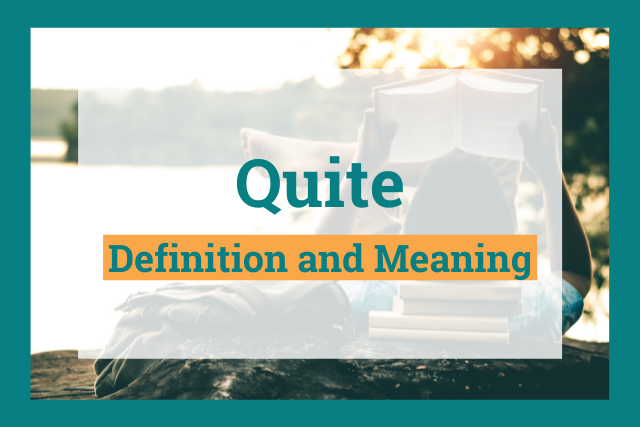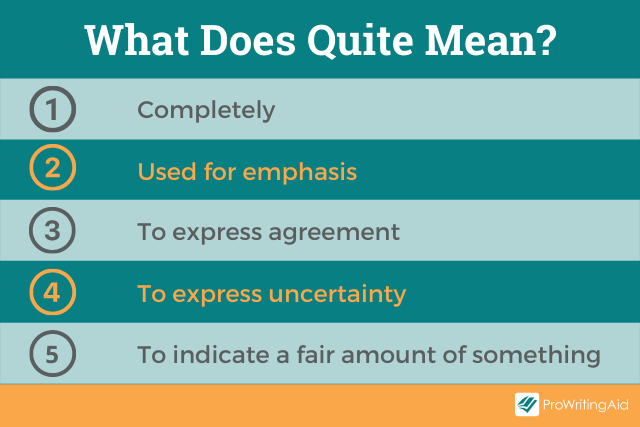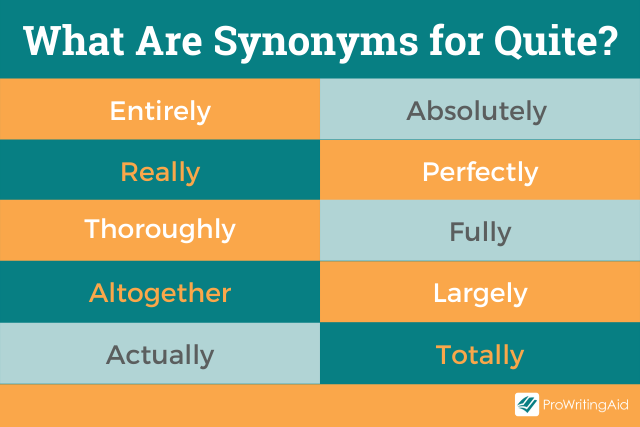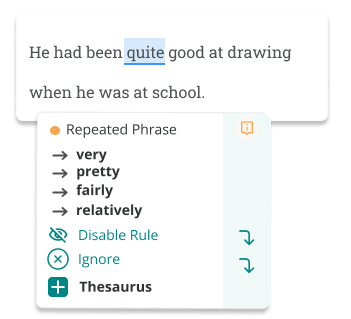
The most common meaning of quite is “moderately, or a little.”
Read on to discover some further definitions, synonyms, and examples of the word quite in a sentence.
Quite Definition
Quite is an adverb which has five primary definitions.
Quite can mean “completely”:
- I am quite taken by Elsa’s new puppy
- He was quite stunned to see his new bike
Quite can express uncertainty:
- I don’t quite understand particle physics
- She wasn’t quite sure what was going on
Quite can be used for emphasis:
- That was quite the worst film I have ever seen
- She is quite a girl
Quite can indicate a fair amount of something:
- I ate quite a lot of pasta
- It took quite a while to do my Spanish homework
- Quite a bit of that tree appears to be dying
Quite can be used to express agreement:
- “That waterfall was beautiful!” she said. “Quite,” he said.
- “I’d say we’re quite in agreement on this proposal.”

Quite Meaning
To determine the meaning of quite in a sentence, it is important to look at the context.
- If quite can be replaced with “totally,” then it is being used as a synonym of “entirely.”
- If quite is used with a negative, then it is probably being used to express uncertainty.
- If quite can be taken out of the sentence without changing the meaning, then it is likely used for emphasis, meaning “to a considerable extent.”
- If quite comes before the phrase “a lot” or “a few,” then it means “to a certain extent or degree.”
- If quite is used in its own sentence, then it is being used as an exclamation to express agreement.
What Are Some Synonyms for Quite?
With quite being the 653rd most common word in the English language, you may find yourself in need of some synonyms and related words to prevent overuse and keep your audience interested.

Here are 12 of the most common synonyms for quite:
| Absolutely | Actually | Altogether | Entirely |
|---|---|---|---|
| Fully | Largely | Perfectly | Really |
| Thoroughly | Totally | Truly | Utterly |
You could also use ProWritingAid’s Word Explorer to discover synonyms for quite that are contextually related to your sentence. This saves time and helps to diversify your vocabulary while keeping the meaning consistent.

Sign up for a free ProWritingAid account and try it now.
Examples of Quite in a Sentence
Here are some examples of quite being used in popular literature.
“He was quite young, wonderfully handsome, extremely agreeable, and, to crown the whole, he meant to be at the next assembly with a large party.”―Pride and Prejudice by Jane Austen
In this quote by Jane Austen, quite means “moderately” and is used to quantify Lady Lucas’ description of Mr. Bingley.
“That’s quite enough—I hope I shan’t grow any more—As it is, I can’t get out at the door—I do wish I hadn’t drunk quite so much!”―Alice’s Adventures in Wonderland by Lewis Carroll
Quite is used in two different ways here. The first example is used for emphasis and the second is used to show that Alice has had slightly too much of the growth drink.

“They say that men who have seen the world, thereby become quite at ease in manner, quite self-possessed in company.”―Moby Dick by Herman Melville
Both instances of quite in this quote are used in the same way, indicating a fair amount of something and lessening the impact of the following words.
“She was quite alone, and there was not a sign of any living thing about.”―Dracula by Bram Stoker
In Stoker’s quote, quite is used to emphasize how alone the character is.
“Quite recently the writer made a localized study of the universality of the belief in dragons.”―The Chinese Dragon by L. Newton Hayes

Here, quite means “moderately” or “fairly,” and it works to make the word recently even less specific.
In Conclusion: Quite Recap
I hope that you are quite sure about the meaning of “quite” after reading this article. Just make sure that you don’t accidentally type “quiet” instead of “quite” (two words that are deceptively similar) and create a very confusing sentence.


